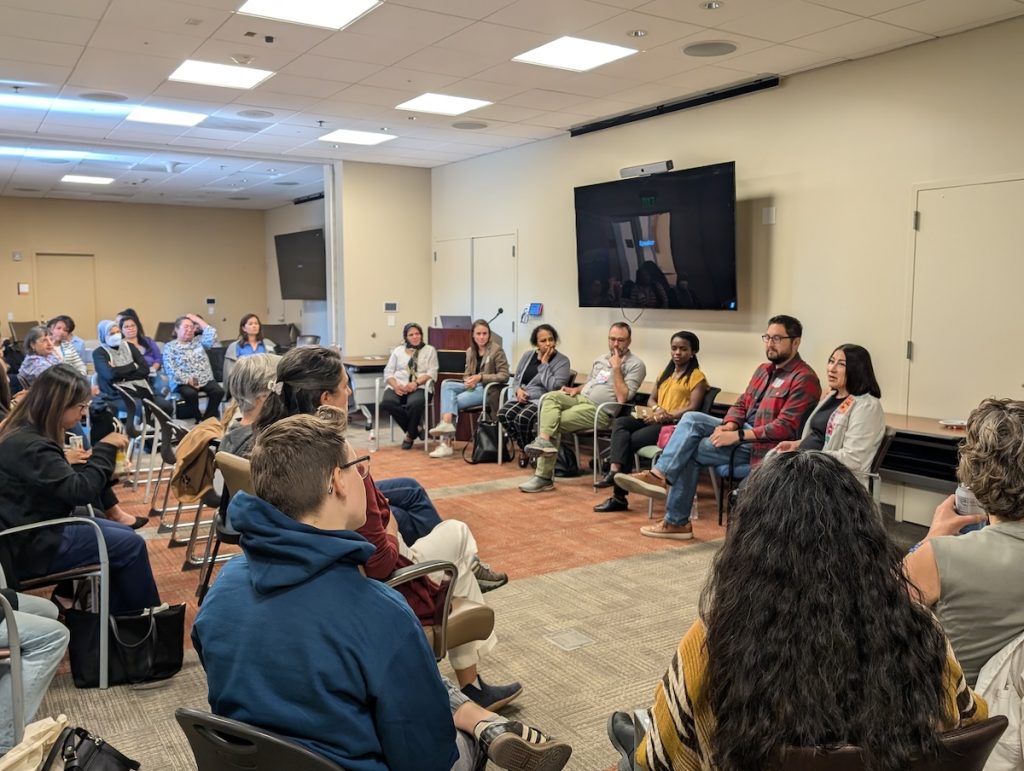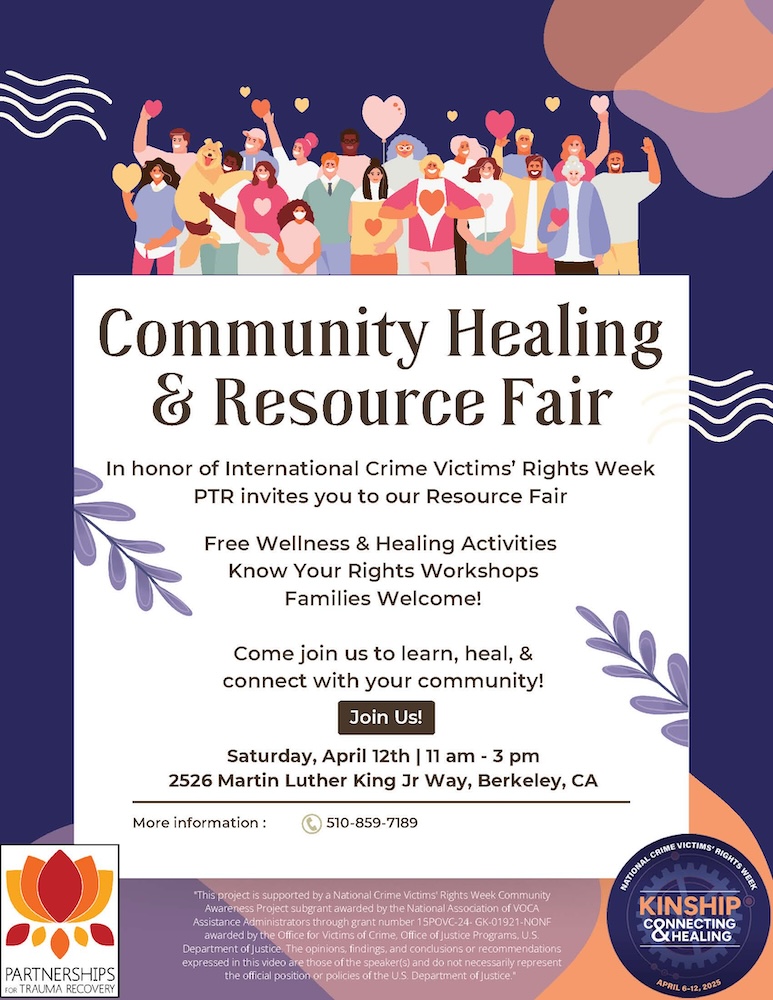Strengthening Access and Connection: PTR’s Interpreter Program

At Partnerships for Trauma Recovery (PTR), we recognize that language is more than just communication—it is a bridge to healing. Our Interpreter Program plays a crucial role in fostering linguistic and cultural connections, ensuring that survivors of trauma can access the mental health care they need in a language they understand. In 2023 alone, 72% of all our sessions were conducted in a language other than English, highlighting the essential role interpreters play in our work. PTR’s team of interpreters is uniquely positioned to provide this vital service. Approximately 80% of our current interpreters have immigrated to the U.S., allowing them to deeply understand and relate to the immigrant experience. Many have also shared that they or their loved ones hold refugee or asylee status, further strengthening their ability to connect with and support our clients in a meaningful way.
However, while interpreters serve as an essential link in the healing process, their own well-being is often overlooked. At PTR, we believe interpreters should be included in conversations about wellness, recognized as integral members of the service provider team. To support them in their work, we offer structured peer workshops, mentorship, and training opportunities focused on resilience, self-care, and community-building.
Our monthly Peer Workshops provide a space for interpreters to engage openly about the challenges they face, including the emotional toll of interpreting traumatic stories and navigating cultural complexities. These workshops foster connection and shared learning, equipping interpreters with strategies to sustain their well-being while continuing to provide high-quality support to clients. One interpreter shared their appreciation for these sessions, saying,

“ I really enjoyed having a space to talk and vent. Also hearing more from other interpreters. Thank you so much for providing that space for us!”
In addition to peer support, we emphasize mindfulness and coping strategies to help interpreters manage stress. Techniques such as breathwork, grounding exercises, tapping, and sensory awareness help regulate the nervous system before and after difficult sessions, enhancing both personal resilience and professional effectiveness.
Mentorship further strengthens our interpreters’ ability to navigate ethical and cultural challenges. By providing a structured space for debriefing and reflection, we help prevent burnout, increase retention, and ensure interpreters can continue their work with renewed energy and focus. By investing in the well-being of our interpreters, PTR strengthens their capacity to provide high-quality services while enhancing the overall effectiveness of trauma recovery. Our commitment ensures interpreters are recognized, valued, and equipped to thrive alongside the clients they serve.
As we continue expanding our Interpreter Program, we invite you to be part of this vital mission. Your support allows us to train and sustain interpreters, ensuring they have the tools to facilitate healing for trauma survivors. Learn more about our work and how you can make a difference by visiting our website and/or making a donation today. Together, we can build a future where language is never a barrier to healing!
Upcoming Event Announcement- April 12, 2025
PTR is honored to Host the 2025 National Crime Victims’ Rights Week: Community Healing and Resource Fair on Saturday, April 12, 2025, at PTR’s Office, 2526 Martin Luther King Jr. Way, Berkeley, CA
This special event will create a space for healing, connection, and empowerment for survivors of all types.
🔹 Free holistic wellness & healing activities
🔹 Victims’ rights & empowerment resources
Together, we can raise awareness, support survivors, and foster community healing.
Mark your calendars and stay tuned for more details!

Partnerships for Trauma Recovery
Donate now!traumapartners.org
Executive Director: Gianina Pellegrini, Ph.D.
(510) 230-7474
Mission
To address the psychosocial impacts of trauma among international survivors of human rights abuses through culturally aware, trauma-informed, and linguistically accessible mental health care and case management, community outreach, clinical training, and policy advocacy.
Begin to Build a Relationship
We know you care about where your money goes and how it is used. Connect with this organization’s leadership in order to begin to build this important relationship. Your email will be sent directly to this organization’s Director of Development and/or Executive Director.
Thank you for working hard and striving on my behalf. I am able to work now and I have learned a lot. If I could do more to express my gratitude, I would. Thank you… You carried my worries like they were yours without complaining and helped me to get where I am. My asylum case has been approved. Thank you, thank you, thank you!
Help Support Emotional Well-Being for Victims of Human Rights Abuses
Trauma recovery is possible. $50,000 provides 10 survivors of torture culturally reflective, trauma-informed, and linguistically accessible mental health care and case management essential for healing. By improving well-being, the ability to engage in daily activities, and a sense of safety, holistic treatment leads to thriving.
A torture survivor from the Middle East expressed, “[PTR is] a center that allows doubt and suffering that you have internally to go away, and helps you fit into society. Without their support, I don’t know if I would be here now . . . It helped me survive. It’s given me a second life, and the opportunity to be alive.”
Key Supporters
Annika Sridharan (Co-Founder)
Monika Parikh (Co-Founder)
Akawak Ejigu (Board Member)
Alexander Cook (Board Member)
Ana Gamez (Board Member)
Catherine Chen (Board Chair)
Gauri Bhardwaj (Board Treasurer)
Hillary Pollaro (Board Co-Chair)
Joseph Asunka (Board Member)
Julianne Orr (Board Secretary)
Stephanie Wu (Board Member)
Kaiser Foundation
Marin Community Foundation
Mehretu Commission Studio
Monardella Fund
O.P. Decker Foundation
Sills Family Foundation
Zellerbach Family Foundation
Alameda County Behavioral Health
California Department
of Health Care Services
California Victim
Compensation Board
Office of Refugee Resettlement
